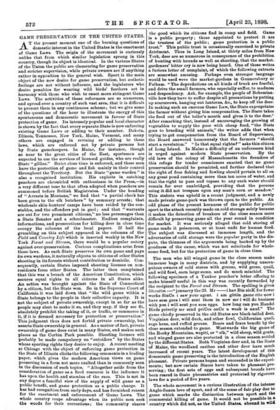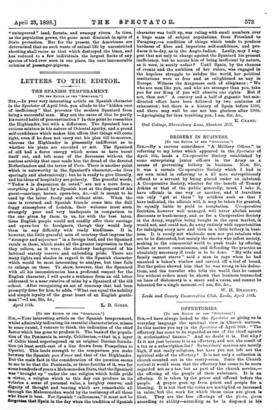GAME PRESERVATION IN THE UNITED STATES.
AT the present moment one of the burning questions of domestic interest in the United States is the enactment of Game Laws. The origin of the movement is curiously unlike that from which similar legislation sprang in this country, though its object is identical. In the various States of the Union the public are clamouring for game preservation and stricter supervision, while private owners are if anything rather in opposition to the general wish. Sport is the main object of the new desire for game preservation, but aesthetic feelings are not without influence, and the legislators who desire penalties for wearing wild birds' feathers act in harmony with those who wish to enact more stringent Game Laws. The activities of these reformers are so numerous, and spread over a country of such vast area, that it is difficult to present them in any continuous scheme; but we give some of the questions of the hour to illustrate the energy of this spontaneous and democratic movement in favour of State protection of game. Its intensely popular and local character is shown by the fact that every separate State is now enforcing existing Game Laws or adding to their number. Dakota, Illinois, Tennessee, New York, Maine, Vermont, and many others are engaged in revising or adding to these laws, which are enforced not by private persons but by State gamekeepers. In Maine, for instance, though so near to the great cities of the East, sportsmen are expected to use the services of licensed guides, who are really State " gillies." Strict close time is enforced, and these men have the protection of game and fish mainly in their control throughout the Territory. But the State "game warden " is also a recognised institution. His exploits in catching poachers are chronicled with enthusiasm in the Press,—in a very different tone to that often adopted when poachers are summoned before British Magistrates. Under the heading of "Arrests in Montana," we find that "a partial check has been given to the elk butchers" by summary arrests; that wholesale skin-hunters' camps have been raided by the con- stables, and the offenders put in gaol ; and that " warrants are out for two prominent citizens," no less personages than a State Senator and a schoolmaster. Endless complaints, informations, and prosecutions for killing deer in close time occupy the columns of the local papers. If half the grumbling on this subject appeared in the columns of the Field and Country Life which is inserted weekly in the New York Forest and Stream, there would be a popular outcry against over-preservation. Curious complications arise from these laws. As each State preserves its own game and pays its own wardens, it naturally objects to citizens of other States shooting in its forests without contribution or domicile. Con- sequently, certain States imposed shooting licenses on non- residents from other States. The latter then complained that this was a breach of the American Constitution, which secures equal rights to all citizens in all States alike. An action was brought against the State of Connecticut by a citizen, but the State won. So in the Supreme Court of California it was laid down that " the wild game within a State belongs to the people in their collective capacity. It is tot the subject of private ownership, except in so far as the people may elect to make it so, and they may, if they see fit, absolutely prohibit the taking of it, or traffic, or commerce in it, if it is deemed necessary for protection or preservation." This judgment thus does not forbid private ownership, but asserts State ownership in general. As a matter of fact, private ownership of game does exist in many States, and makes such places as the Corbin Park possible. Shooting licenses will probably be made compulsory on "outsiders" by the States whose sporting rights they desire to enjoy. A recent meeting at Chicago with the object of enforcing game protection in the State of Illinois elicits the following comments in a leading paper, which gives the modern American views on game preserving in a form not more exalted than is commonly seen in the discussion of such topics. "Altogether aside from the consideration of game as a food resource is the influence it has upon the health and stamina of the race. This is not in any degree a fanciful view of the supply of wild game as a public benefit, and game protection as a public charge. It has had recognition from early days, and has furnished reason for the enactment and enforcement of Game Laws. The whole country reaps advantage when its public men seek the woods for their recreations ; the community shares
the good which its citizens find in camp and field. Game is a public property ; those appointed to protect it are the trustees of the public ; game protection is a public trust." This public trust is occasionally exercised to private detriment. Thus in Long Island, at thirty miles from New York, deer are so numerous in consequence of the prohibition of hunting with hounds as well as shooting, that the market- gardeners' bitter cry is now being heard. One of these writes a furious letter of complaint, of which the following extracts are somewhat amusing. Perhaps even stronger language would be used were the market-gardens in Gunnersbury or Fulham. "The depredations on all kinds of truck are fearful, and drive the small farmers, who especially suffer, to madness and despondency. Ask, for example, the people of Bohemian- ville how they have to suffer despite all precautions by putting up scarecrows, hanging out lanterns, &c., to keep off the deer. In making such an onerous Game Law, the State expropriates the farmer without giving him compensation. The State takes the food out of the toiler's mouth and gives it to the deer." After remarking that, instead of encouraging the growing of vegetables to supply the poor with cheap food, "the State goes to breeding wild animals," the writer adds that when trying to get compensation from the Board of Supervisors, the Board answered humorously that the farmers " should start a revolution." "Is that equal rights P " asks this citizen of Long Island. In Maine a difficulty of an unforeseen kind is urged against modern State preservation. By the old laws of the colony of Massachusetts the founders of this refuge for tender consciences enacted that no game preservation should be permitted, and further declared that the right of free fishing and fowling should pertain to all on any great pond containing more than ten acres of water, and that the right to pass and repass to any such water should remain for ever unabridged, providing that the persons using it did not trespass upon any man's corn or meadow." This statute was upheld in a recent judgment, and a newly made private game-park was thrown open to the public. An odd phase of the present keenness of the public for public sport is the attack recently made on cold storage solely because it makes the detection of breakers of the close season more difficult by preserving game all the year round in condition for market. It was seriously alleged that cold storing of game made it poisonous, or at least unfit for human food. The subject was discussed at immense length, and the adversaries of cold storage were the popular party in the dis- pute, the thinness of the arguments being backed up by the goodness of the cause, which was not solicitude for whole- some food, but for the protection of game in close time.
The men who kill winged game in the close season make immense bags in many districts, and by supplying unscru- pulous owners of cold stores with grouse, wild geese, quail, and wild fowl, earn large sums, and do much mischief. The following specimen of a Yankee poacher's letter offering to make himself useful in this way was recently forwarded by the recipient to the Forest and Stream. The spelling is given literatim :—" jenuarry the 28. Mr i hav Bin sicK for fower weeks SinCe i saw your agent. i am gittin game rite now i have soli gees i will sent them in now mr i will do business with you i will sent you som eggs. how long can you Handel Birds privetly mr send priCes onCe a weak is anuf." The game chiefly preserved in the old States are black-tailed deer, Virginian deer, wild duck, and other fowl, Californian quail, sage hens, and ruffed grouse. Bears and foxes benefit by the close season extended to game. Westwards the big game of the Rooky Mountains, wapiti, or " elk," wild sheep, wild goats, and winged game are also protected in a close season settled by the different States. Both Virginian deer and, in the State of Maine, the woodland cariboo and other deer have much increased of recent years. The latest development of this democratic game preserving is the introduction of the English pheasant. Private persons began and succeeded in the experi- ments; but now certain States have taken to pheasant pre- serving ; the first sets of eggs and subsequent broods have been reared in State pheasantries and protected by rigorous laws for a period of five years.
The whole movement is a curious illustration of the intense Anglo-Saxon love of sport, and of the sense of fair play due to game which marks the distinction between sport and the commercial killing of game. It would not be possible in a country which did not, as the United States, abound in will "unimproved" land, forests, and swampy rivers. In time, as the population grows, the game must diminish in spite of State protection. But for the present the Americans are determined that no such waste of animal life by unrestricted shooting shall recur as that which destroyed the bison, and has reduced to a few individuals the largest flocks of any species of bird ever seen in one place, the once innumerable colonies of passenger-pigeons.



































 Previous page
Previous page